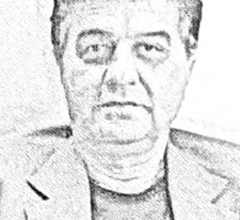Bertolt Brecht was a German playwright, a poet and a short story writer. He was a committed Marxist and he introduced the technique of Epic theatre along with other prominent playwrights. It was a deviation from the genre of the suspension of the disbelief with the purport to confront the audience with the social realities. Epic theatre is anti-Aristotelian theatre anddemolishes the ‘fourth wall’ performance which separates actors from the audience, whereas, the stage of the Epic theatre is in full view of the audience and characters speak, discuss and laugh with audience. The art, in epic theatre, turned into a political activity and proved to be a direct method of pedagogy of the oppressed. In India, Badal Sarkar went beyond the proscenium and brought theatre into public arena to perform his anti-establishment plays in the high noon of the Naxalite movement in 70s’.
Bertolt Brecht who was a dazzling story teller also penned Socrates Wounded to narrate a tale of Socrates as a soldier as he is known to the world in the words of Brecht, “not only the cleverest of all Greeks but also one of the bravest.” The story is based on the battle of Delium; one of the Peloponnesian wars (431-404 BC) when Socrates participated and distinguished himself in those battles against Spartans. Plato also mentioned of the battle of Delium in his Socratic Dialogues under Laches. And Socrates unraveled the concept of courage in the dialogues.
To Socrates courage is noble. He asks Laches if foolish endurance is noble? He calls foolish endurance an evil. That seems a political stance. Nothing more is said about courage.
If anger is the epitome of valor, then it stems from possession. A possession of property or in male- dominated society it can be a possession of a woman when your property is transgressed you are ferocious
In Brecht’s story Socrates fled the battle ground and was caught in the fields of the thorny bushes. Socrates always went bare footed so got stuck in those thorny fields. When the enemy approached him, he clamored for succor and in great panic he swayed his sword in frenzy that beheaded six of the enemies and the rest retreated. Pronounced as the hero of the war Socrates refused coronation by telling the truth of his valor.
Brecht accentuated the moral virtue as a great valiancy.
Interestingly, Brecht found himself in the same ordeal in the USA on 30 October 1947. Brecht and his family moved to Santa Monica, California in 1941. He was subpoenaed to appear before the House on un-American Activities Committee and during the trial Brecht liedduring hearing “Well comrade you can ask any question you want to ask. I was not a member or I’m not a member of the Communist Party.”
To be an upright, I think, has been an ideal state of mind in the philosophy of ethics. Though history had engendered an aura of uprightness around many celebrated characters of history. Well, you require a person who is well versed in the philosophy of moral ethics to answer your queries.
Coming back to the story Socrates fled the battle out of trepidation. Justified. But from the chivalric age till today we are never tired of accolading the chivalric acts of individuals around or in the battle fields. At times we show our prows while under stressed of our peers and at times in the frenzy of war.
Valor is “strength of mind or spirit that enables person to encounter danger with firmness.”Quote is of Merriam Webster dictionary. Is valor an innate idiosyncrasy of humans? Montaigne averred,”Valor……can’t be perfected without the assistance of choler.”
If anger is the epitome of valor, then it stems from possession. A possession of property or in male- dominated society it can be a possession of a woman when your property is transgressed you are ferocious. But the valor of gladiators in Roman empire remained an enigma. The gladiators were the slaves and would fight a mortal game to please the audience knowing the death is formidable. Ernest Hemingway in his story “The Killer” portrays a valor of a destitute who has no option left but to die. Gladiators were destitute and bowed before their fate. Russell M. Miller in his discussion on Coriolanus (I yet to read this play); a Roman tragedy by Shakespeare, has a point to make by suggesting, “Between the poles of vindictive anger and conciliatory pity through which Maritus [the protagonist] moves, the warrior discloses all that’s cruelly present and constitutive of Rome and all that’s pitilessly absent and lacking from it. Rome’s cruelty and pitilessness are the conditions of its valor and forcefulness, and, its self-destruction.” So, “valor will weep” in the words of Shakespeare.
One of my gurus Alister Cooke in his letter, “Now Here is the Nightly News written and broadcasted on 7 June 1970.” recounts the Flanders campaign in the First World War. The British suffered heavy casualties in the campaign but the British officials in France had a stance of high morale of the troops. Later, Gibbs, who fought that war, in his book Now It Can Be Told had a sharp recollection of the campaign, noted “increasing number of arrests and executions for desertion” during Flanders campaign.
The writer is Professor at English Language Center, Taif University, KSA
